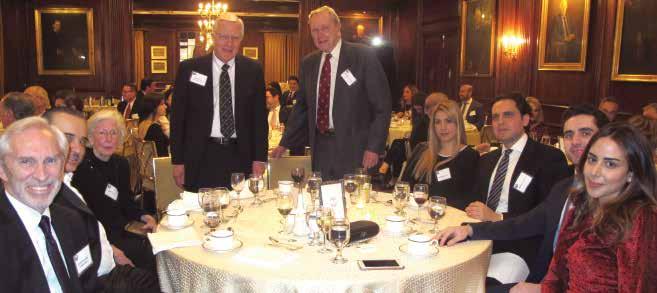
4 minute read
The Adventures of Alexander MacLachlan 2(Part XVII
The Adventures of Alexander MacLachlan:
Rev. Alexander MacLachlan

IC struggles to stay open during WWI
WWI was raging on and despite the nearby aerial bombardment, the spread of famine and diseases, Protestant Minister,
Reverend Alexander MacLachlan, was determined to keep the school going. If
IC were to close, Turkish authorities would immediately seize the campus for its own military use, as was the fate of other foreign schools. It was MacLachlan’s continuous fear….
Reverend MacLachlan surveyed his school forlornly. By all means, the school could not continue. Only five teachers remained out of the original 24. And of those, professors Gulbenkian and Tchiboukdjian were about to be called for military duty, while Prof. Papadopoulos, a Cypriot, was under probation as a British subject.
This would just leave two men of “stout of heart and strong of arm:” IC’s Dean, Cass Reed and Prof. Samuel Lee Caldwell.
The two men were his last remaining hope.
Then came the bad news: Reed received notice that as an American citizen, he could be not be accepted as Acting Director of the College during the war – effectively destroying the last hope that IC could even carry out a limited number of classes.
In desperation, MacLachlan called on Smyrna Governor Rahmi Bey at his private residence in Bournabat. Bey, forever faithful to his foreign constituencies and its Christian population, had ordered – against the wishes of his Turkish superiors – to keep foreign schools in Smyrna open.
Bey listened carefully to MacLachlan’s woes and immediately came to his rescue: since Turkey is not officially at war with America, Reed may continue with his duties at IC.
The next day, MacLachlan put an advertisement in the newspaper that IC will indeed continue with its classes (for day students only) and
Smyrna (Part XVII)
was currently accepting applicants. But since the school was functioning with a skeleton of a faculty, only 100 students will be accepted and, moreover, the tuition will be doubled.
MacLachlan waited. To his amazement, applications rained in but he was only able to accept 117 students. While the boarding section of the school was shut down, many students – up to 25 – came back to IC anyway and managed to find boarding in homes nearby. With the scarcity of textbooks, MacLachlan had no choice but to relegate the responsibility of securing the required books to the students – unfortunately, giving birth to a black market of IC textbooks. Still, the students came.
“Owing to the friendly attitude of the Governor, I was again able to take charge of regular morning chapel exercise, and to continue the care of office administration and accounts in addition to my regular classroom duties,” he wrote the Board in the 1917-1918 Annual Presidential Report. “Dean Reed, as acting Mudir, represents the College before the government and, in addition to his duties as Dean, conducts four hours of daily classroom work.”
For his part, Prof. Caldwell had his own load of classwork and ran the electric lighting plant and library.
Somehow, the men kept IC open and classes running and as MacLachlan insisted with “very thorough work which was done in all the classes, and the former standards were fully mainlined in the classroom and the final examinations.”
Despite his own troubles, it would have been very difficult for MacLachlan to turn a blind eye to the obvious and growing needs around him.
The first call for relief work from a nearby Greek village, Prophet Elias, made up of 100 families. The men of the village were called to serve in the auxiliary service camp in the Turkish army - leaving the women and children destitute. Upon hearing the news, MacLachlan set up a relief center in the village. But the center soon became overwhelmed with desperate appeals from other neighboring villages. Finally, MacLachlan moved the center to the IC campus itself.
The Turkish government, for its part, was providing rationed supplies at two cents a day. But even that proved too much money for famine ridden families.
“We are now feeding two thousand daily, and our food supplies are limited to horse beans and olive oil, both very common and nourishing articles of diets,” wrote MacLachlan. “But as the war continues, all food supplies were requisitioned by the government and we could no longer purchase supplies in the interior (of the country) and for some time we provided the money equivalent of the food ration for each family.”
This, MacLachlan was able to provide, thanks to a ten thousand dollars gift from the American Near East Relief.
In the midst of the relief operation and despite the war and the famine, MacLachlan had to hold his chuckles as he noted a Turkish volunteer, Mehmet Bey, adding his own little tidbit in the relief work. For every handout, he would sternly tell the recipients, “Pray for the Americans.”
Meanwhile, the war seemed never ending. Could IC possibly continue for another year?
“We recognize the possibility and perhaps even the probability of America and Turkey being at war with each other before the time for our autumn opening arrives,” he wrote. “This, we presume, would mean the closing of the college by the Turkish authorities, and yet such a step might not necessarily follow, and in view of all the ways in which the college has been guided and blessed in the past, we are hopeful that even another year of service is possible under existing conditions.”

To be continued…..
Historical information based on: An interview with Dr. Howard Reed (summer 2011); Potpourri of Sidelights and Shadows from Turkey, by Alexander MacLachlan, 1937; The Fifteenth Annual President’s Report and Financial Statement, 1917-1918.










